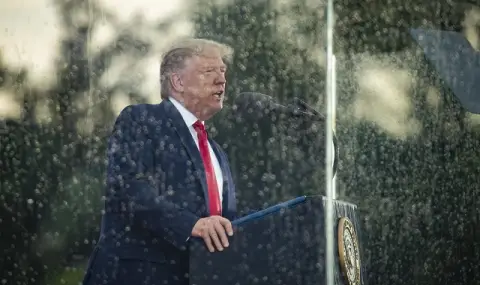Trump is a neoliberal. He believes in competition, but he feels that free trade is cheating him. That is why he wants to stop globalization or at least change it so that only the US benefits from it, says an expert.
"President Donald Trump wants to get rid of globalization. His administration and parts of his voters believe that the US is harmed by globalization and at least want to change it significantly in favor of the US", said historian Mark Bugeln from the University of Flensburg in an interview with ARD. However, he notes that the facts do not support Trump's theses: “Of the major industrial nations, the US has the highest average per capita income. The economic development in recent years has also been good, and seven of the ten richest people in the world are Americans. This is not without significance, because Trump constantly talks about wanting to return to the time of prosperity at the end of the 19th century.
The historian points out to the German public-law media that globalization may have harmed certain parts of the American working class, but this is due to the uneven distribution of wealth and the great social inequality. “However, this topic is not discussed, which is why other nations are accused of deceiving the United States with unfair trade methods.“ Mark Bugeln also points out that the feeling of being deceived is very dangerous – in this case, rational arguments take a back seat and revenge is sought. “It seems that Trump is currently shooting the world with a rifle, but in the process he is shooting himself in the foot.“
"He is destroying the international system of neoliberalism"
However, how does the new customs policy fit into the political logic of the Trump administration?
M. Bugeln: This is a really difficult question. It is about the feeling that you have to take revenge because you have been cheated. In many ways, Trump is a neoliberal: he wants to cut taxes, destroy the welfare state, he believes in competition. But he also believes that free trade is cheating him. This is the feeling that neoliberalism works in the United States, but not as an international system. And he is fighting against this, trying to impose his tariff plans and to provoke a kind of trade war internationally, in which he would use all the power of the United States.
Internationally, he does not want to stick to the rules, but wants to use the United States and its position as the strongest nation to harm others and do good to itself. But in doing so, he is destroying the international system of neoliberalism.
"Authoritarian-national neoliberalism" within the United States
Is what Trump is trying to establish the end of the neoliberal economic model or is it a new neoliberalism in an even more radical form?
M. Bugeln: And this is a difficult question. I would say that a lot of authoritarian-national neoliberalism is taking place within the United States. There is no redistribution of wealth, the state is being destroyed, further tax cuts are coming. But in this way the international neoliberal system is being destroyed. At first, economists still said - something must be done, China is being unfair to us. In the meantime, however, even neoliberal economists consider Trump's policy to be complete madness, since he is destroying the international trading system and thus creating many problems.
Will it lead to a global economic crisis?
Some are already drawing parallels with the 1930s, when tariffs were believed to be the cause of the Great Depression. Do historians see such parallels?
M. Bugeln: The global economic crisis was not caused by tariffs, but by industrial overproduction and the collapse of the US stock markets. Nations resorted to currency devaluation and the introduction of tariffs only when the crisis deepened - to secure advantages over others. Historians are relatively unanimous that tariffs only exacerbated the crisis.
The difference is this: At the time, tariffs were imposed at a time when the global economic crisis was at its deepest. However, now the indicators are better: after the pandemic and the war in Ukraine, many nations have begun to recover economically. And the economic situation in the United States under former President Joe Biden was also quite good. Many indicators have improved. That is, the current tariff offensive affects the global economy, which, however, is not in a state of crisis.
Whether we will reach a crisis comparable to that of the 1930s, however, depends on whether other nations react with similar protectionism. This is very likely to be undertaken against Trump. And if other countries react like Trump, we may indeed reach a situation like the 1930s.
Mark Bugeln is a professor at the European University in Flensburg and director of the Research Center for Contemporary History.
